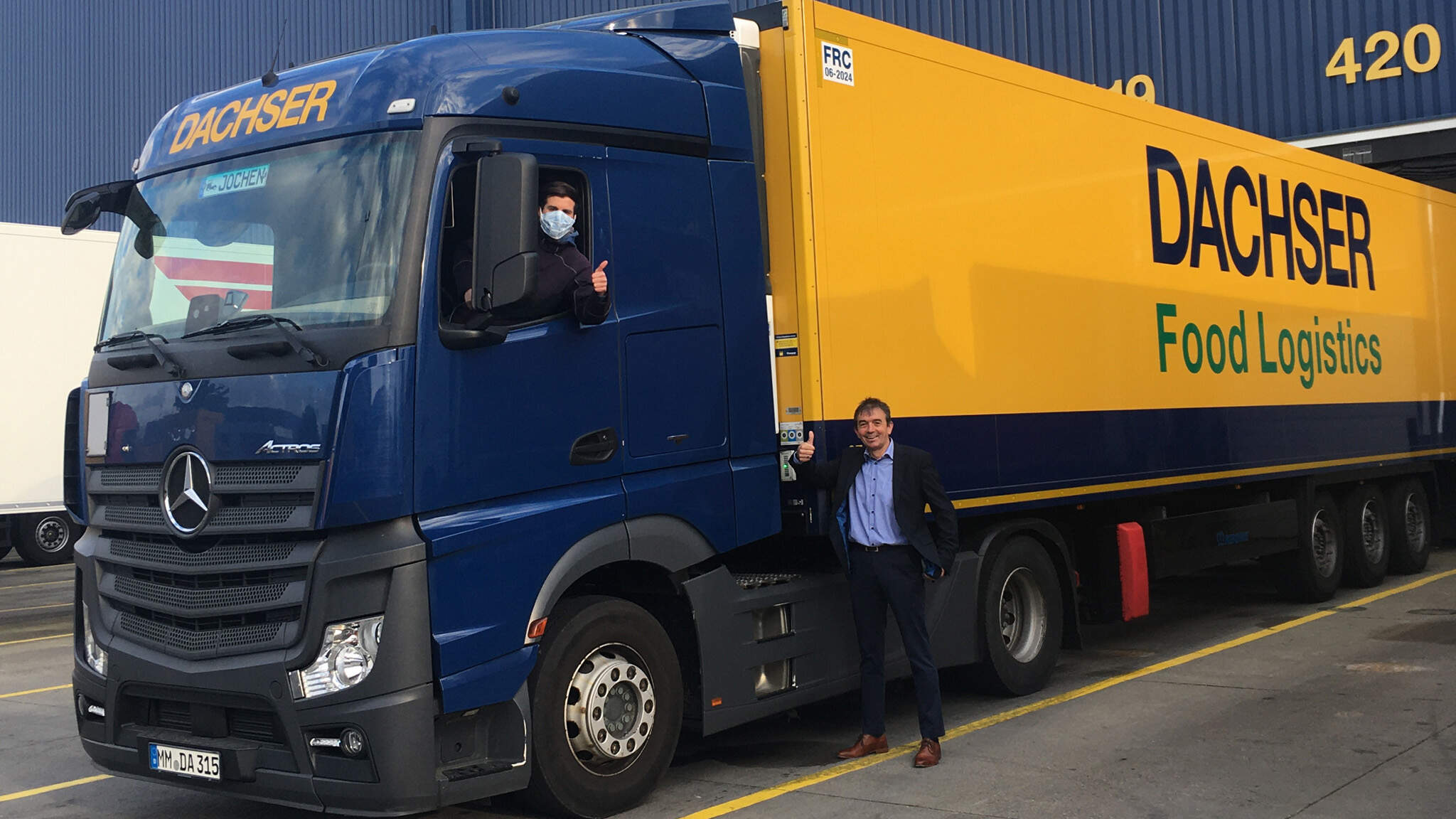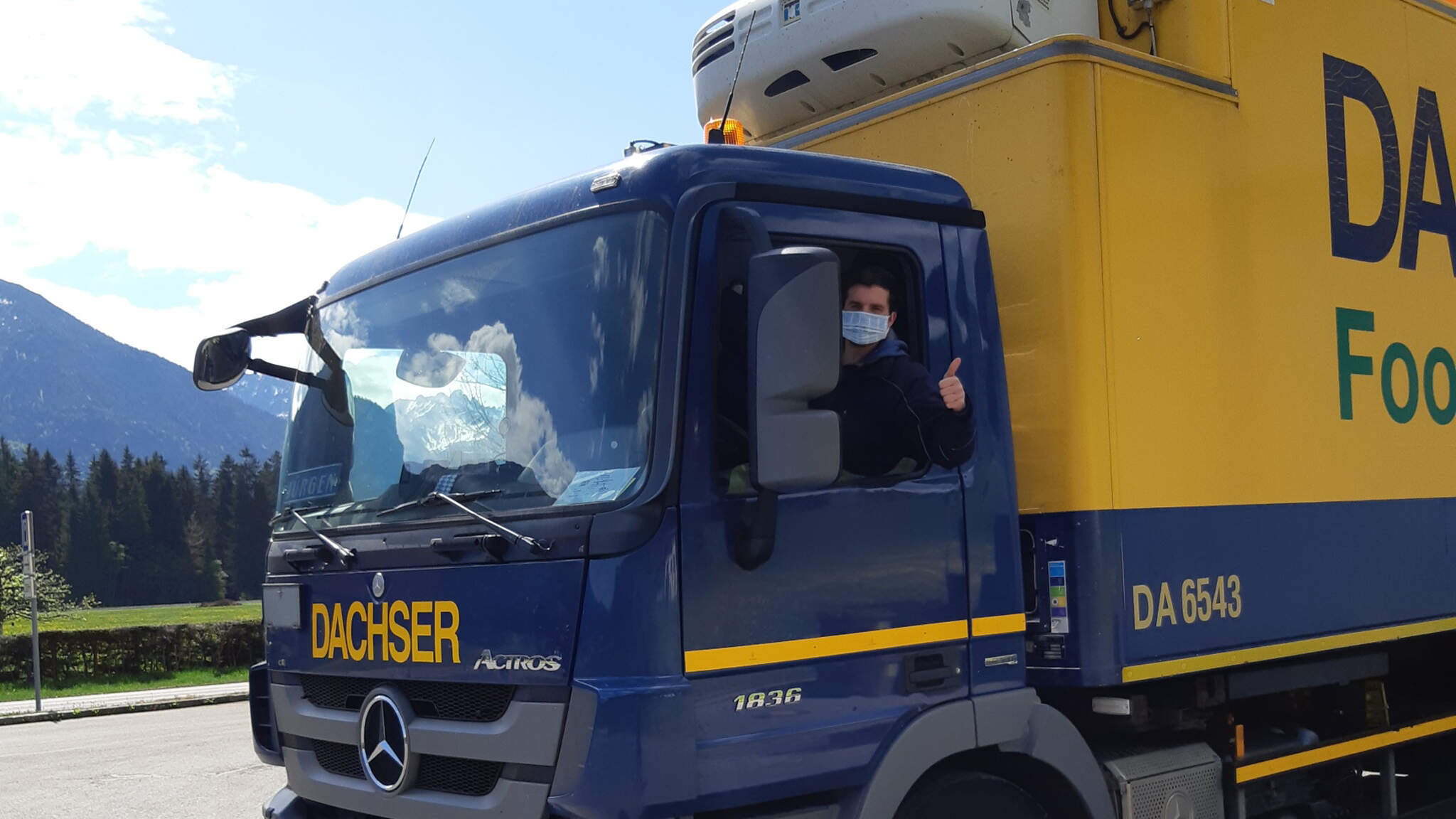“Suddenly seen as everyday heroes”
Truck drivers are “essential workers” and are keeping the supply chains running reliably—even in times of crisis. A driver’s working life is pretty challenging at present, but there are positives too. An interview with driver and fleet manager Christian Ludwig and Jürgen Schneider, inbound and short-distance transport manager at DACHSER in Memmingen.

Fortunately, the congestion at Germany’s borders leading to Eastern Europe, Austria, and Italy, which sometimes had trucks lining up for hours, has eased. At the beginning of the coronavirus crisis, this did not bode well for supply chains. But even though traffic is moving again, the Covid-19 pandemic has significantly changed the daily lives of professional truck drivers.
At DACHSER in Memmingen, for instance. The DACHSER branch started by introducing additional hygiene measures, installing Plexiglas screens with openings at the dispatch counters, and adding distancing markers on the floor to provide drivers and office staff with the best possible protection. “Later on, the cafeteria switched to serving only food to go, and the drivers were provided with face masks, disinfectant spray, and spare clothing,” says professional truck driver Christian Ludwig. Once an informal meeting place, the smoking area now sees only up to two people at a time and they must maintain distance from one another.
Even the procedure for delivering goods has changed. “Direct personal contact is now rare, at least with business customers. How strict a customer’s preventative measures are varies and depends largely on the sector,” Ludwig says. He reports that one pharmaceutical company, for instance, requires a detailed health questionnaire to be filled out and temperatures taken prior to delivery. And in the food sector, face masks and rigorous disinfection are generally compulsory. However, Ludwig notes that elsewhere, people’s attitudes toward the situation are somewhat more relaxed. This includes for instance many private customers, the number of which has doubled at DACHSER’s Memmingen branch since the coronavirus crisis began.
Receiving appreciation
As we have seen, the coronavirus crisis is a fixed part of drivers’ daily lives. Face masks and the frequent washing and disinfecting of hands are the order of the day, as is of course keeping distance from others, at least on a physical level. In fact, Ludwig is seeing that people are tending to engage with one other on a more personal level than they used to. He says that when he delivers, say, a washing machine or a complete greenhouse, many people are keen to know how the current situation is affecting professional truck drivers. He has sometimes been given a small gift or a candy bar as a thank-you. “Things like that certainly give us an extra motivational boost. In my entire career, I’ve never felt more highly appreciated,” Ludwig says.
"In my entire career, I’ve never felt more highly appreciated.” Christian Ludwig, driver and fleet manager.
Jürgen Schneider, inbound and short-distance transport manager at DACHSER’s Memmingen logistics center, wholeheartedly agrees: “I’ve been at DACHSER for 35 years now. In these difficult times, appreciation for the logistics sector is particularly high. We’ve stopped hearing, ‘The truckers are clogging up the roads.’ Now it’s: ‘Great that DACHSER is enabling us to collect and deliver the goods on time.’ People in our profession are suddenly seen as everyday heroes—just like the care workers.” Schneider says that it’s apparently only in an emergency do we realize how important certain professions are.
When much of what we take for granted falls away, people become much more aware of how important it is to meet basic needs. But Ludwig says that none of his drivers is afraid to do their job: “From the very beginning, we felt that DACHSER was taking care of us. All take this virus very seriously, but none of us has felt afraid, thanks largely to the swiftly implemented preventative measures.” As the country begins to get back to normal, Ludwig is now starting to see that customers too are in better spirits, even if people everywhere are worried about keeping their jobs. Many companies—notably in the metalworking, electronics, restaurant, hotel, events management, and catering sectors—have suffered a loss in revenue of 80 percent and in many cases even 100 percent.
“At DACHSER, current distancing rules mean that only half of the office desks are occupied,” Ludwig says. This could be a viable option for restaurants with tables outside, or for hotels. “So many depend on these industries—their situation is also affecting vegetable farmers, butchers, and breweries,” Ludwig says.
The lockdown has had an impact on DACHSER in Memmingen, too. Operations in many sectors are either at a standstill or have been massively scaled back. Naturally, this is affecting the number of transports.

Weathering the crisis together
“DACHSER is making every effort, however, to minimize the negative effects for those transportation companies under contract,” Schneider says. “We’re using vehicles in rotation, so that cancellations remain as minimal as possible for each company. We’re in close contact with our transport partners and want to let them know that they are part of the DACHSER family and that we’ll get through this crisis together.” Schneider says it’s not about faster, higher, further, it’s about inclusive responsibility, honesty, and reliability: “In other words, values that have always formed the backbone of the DACHSER ethos.”
Schneider hopes that the logistics sector will retain its current status in society: “The empathy, solidarity, and appreciation we’re currently experiencing for the work we do provides a very different basis for collaboration and communication across all levels. And this in turn makes driving more attractive as a career, which has to be a priority.”